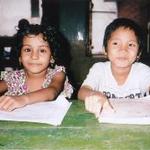CMI Working Paper
| 2012
Son preference, number of children, education and occupational choice in rural Nepal
Bergen: Chr. Michelsen Institute (CMI Working Paper WP 2012:8) 26 p.
How to cite this publication:
Magnus Hatlebakk (2012). Son preference, number of children, education and occupational choice in rural Nepal. Bergen: Chr. Michelsen Institute (CMI Working Paper WP 2012:8)
A unique family survey was conducted in Nepal to investigate the economic consequences of having a first-born girl. Women get more children, but we find no causal effect of number of children on economic outcomes. But independently of the number of children there is a positive effect on boys' education of having a first born sister, who presumably takes care of household work so the boys can focus on school. This indicates a stronger son-preference in Nepal than what is found in studies from neighboring countries.
Magnus Hatlebakk
Senior Researcher; Coordinator: Poverty Dynamics

Gender of children, education and occupational choice in Nepal
Dec 2010 - Jun 2014







